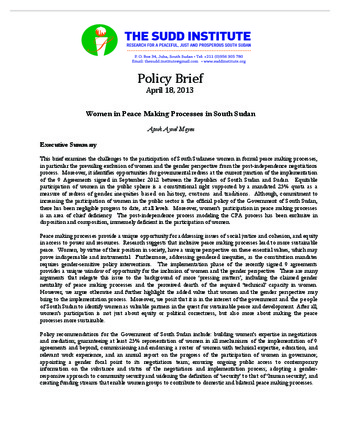Women in Peace Making Processes in South Sudan
Publication Summary
This brief examines the challenges to the participation of South Sudanese women in formal peace making processes, in particular the prevailing exclusion of women and the gender perspective from the post-independence negotiations process. Moreover, it identifies opportunities for governmental redress at the current junction of the implementation of the 9 Agreements signed in September 2012 between the Republics of South Sudan and Sudan. Equitable participation of women in the public sphere is a constitutional right supported by a mandated 25% quota as a measure of redress of gender inequities based on history, customs and traditions. Although, commitment to increasing the participation of women in the public sector is the official position of the Government of South Sudan, there has been negligible progress to date, at all levels. Moreover, women’s participation in peace making processes is an area of chief deficiency. The post-independence process modeling the CPA process has been an exclusive process, in disposition and composition, immensely deficient in the participation of women.
Peace making processes provide a unique opportunity for addressing issues of social justice and cohesion, and equity in access to power and resources. Research suggests that inclusive peace making processes lead to more sustainable peace. Women, by virtue of their position in society, have a unique perspective on these essential values, which may prove indispensable and instrumental. Furthermore, addressing gendered inequities, as the constitution mandates requires gender-sensitive policy interventions. The implementation phase of the recently signed 9 agreements provides a unique window of opportunity for the inclusion of women and the gender perspective. There are many arguments that relegate this issue to the background of more ‘pressing matters’, including the claimed gender neutrality of peace making processes and the perceived dearth of the required ‘technical’ capacity in women. However, we argue otherwise and further highlight the added value that women and the gender perspective may bring to the implementation process. Moreover, we posit that it is in the interest of the government and the people of South Sudan to identify women as valuable partners in the quest for sustainable peace and development. After all, women’s participation is not just about equity or political correctness, but also more about making the peace processes more sustainable.
Policy recommendations for the Government of South Sudan include: building women’s expertise in negotiations and mediation; guaranteeing at least 25% representation of women in all mechanisms of the implementation of 9 agreements and beyond; commissioning and endorsing a roster of women with technical expertise, education, and relevant work experience, and an annual report on the progress of the participation of women in governance; appointing a gender focal point to its negotiations team; ensuring ongoing public access to contemporary information on the substance and status of the negotiations and implementation process; adopting a gender-responsive approach to community security and widening the definition of ‘security’ to that of ‘human security’; and creating funding streams that enable women groups to contribute to domestic and bilateral peace making processes.
Women’s civil society organizations and professional associations have a key role to play in the quest for increased women’s participation in governance in general, and in peace making processes in particular. Policy recommendations for these bodies include: adopting a ‘women’s agenda’ during the upcoming South Sudan Women’s National Conference; participating in the process of the South Sudan National Action Plan on 1325 and ensure it includes concrete benchmarks; establishing a women’s machinery for advocacy and lobby for the participation of women in governance; and contributing to the establishment of the roster of women Furthermore, this brief recommends that political parties recruit and develop women cadres and ensure at least 25% participation, especially in decision and policy-making positions.
Apuk Ayuel Mayen is a career diplomat with the Ministry of Foreign Affairs and International Cooperation of the Republic of South Sudan.

